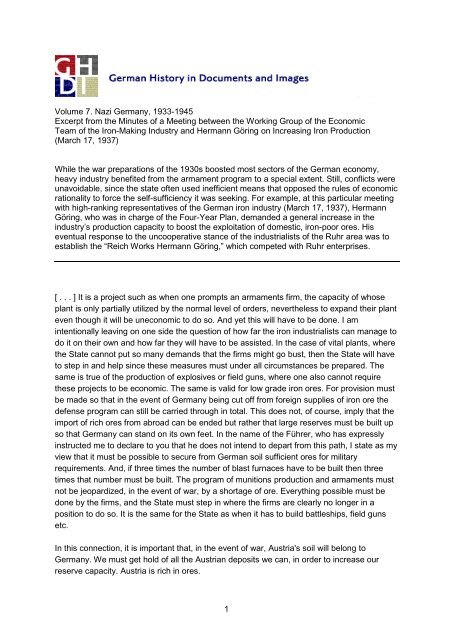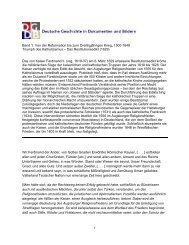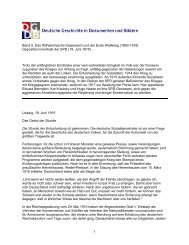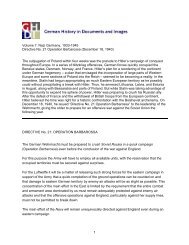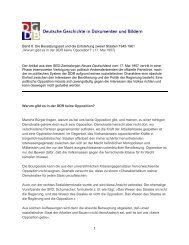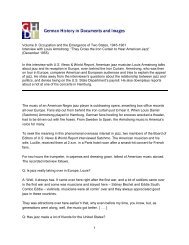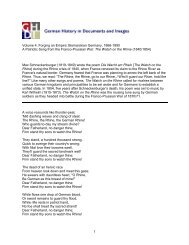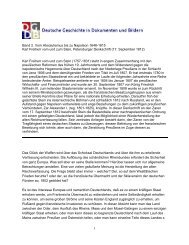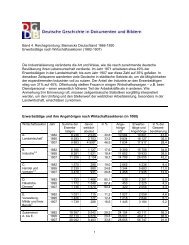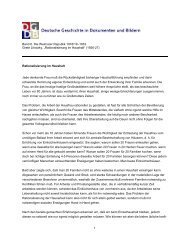print version
print version
print version
Create successful ePaper yourself
Turn your PDF publications into a flip-book with our unique Google optimized e-Paper software.
Volume 7. Nazi Germany, 1933-1945<br />
Excerpt from the Minutes of a Meeting between the Working Group of the Economic<br />
Team of the Iron-Making Industry and Hermann Göring on Increasing Iron Production<br />
(March 17, 1937)<br />
While the war preparations of the 1930s boosted most sectors of the German economy,<br />
heavy industry benefited from the armament program to a special extent. Still, conflicts were<br />
unavoidable, since the state often used inefficient means that opposed the rules of economic<br />
rationality to force the self-sufficiency it was seeking. For example, at this particular meeting<br />
with high-ranking representatives of the German iron industry (March 17, 1937), Hermann<br />
Göring, who was in charge of the Four-Year Plan, demanded a general increase in the<br />
industry’s production capacity to boost the exploitation of domestic, iron-poor ores. His<br />
eventual response to the uncooperative stance of the industrialists of the Ruhr area was to<br />
establish the “Reich Works Hermann Göring,” which competed with Ruhr enterprises.<br />
[ . . . ] It is a project such as when one prompts an armaments firm, the capacity of whose<br />
plant is only partially utilized by the normal level of orders, nevertheless to expand their plant<br />
even though it will be uneconomic to do so. And yet this will have to be done. I am<br />
intentionally leaving on one side the question of how far the iron industrialists can manage to<br />
do it on their own and how far they will have to be assisted. In the case of vital plants, where<br />
the State cannot put so many demands that the firms might go bust, then the State will have<br />
to step in and help since these measures must under all circumstances be prepared. The<br />
same is true of the production of explosives or field guns, where one also cannot require<br />
these projects to be economic. The same is valid for low grade iron ores. For provision must<br />
be made so that in the event of Germany being cut off from foreign supplies of iron ore the<br />
defense program can still be carried through in total. This does not, of course, imply that the<br />
import of rich ores from abroad can be ended but rather that large reserves must be built up<br />
so that Germany can stand on its own feet. In the name of the Führer, who has expressly<br />
instructed me to declare to you that he does not intend to depart from this path, I state as my<br />
view that it must be possible to secure from German soil sufficient ores for military<br />
requirements. And, if three times the number of blast furnaces have to be built then three<br />
times that number must be built. The program of munitions production and armaments must<br />
not be jeopardized, in the event of war, by a shortage of ore. Everything possible must be<br />
done by the firms, and the State must step in where the firms are clearly no longer in a<br />
position to do so. It is the same for the State as when it has to build battleships, field guns<br />
etc.<br />
In this connection, it is important that, in the event of war, Austria's soil will belong to<br />
Germany. We must get hold of all the Austrian deposits we can, in order to increase our<br />
reserve capacity. Austria is rich in ores.<br />
1
Source of English translation: Jeremy Noakes and Geoffrey Pridham, eds., Nazism, 1919-<br />
1945, Vol. 2: State, Economy and Society 1933-1939. Exeter: University of Exeter Press,<br />
2001, p. 119.<br />
Source of original German text: Bundesarchiv Koblenz, R 131/1063; re<strong>print</strong>ed in Wolfgang<br />
Ruge and Wolfgang Schumann, eds., Dokumente zur deutschen Geschichte 1936-1939.<br />
East Berlin, 1977, pp. 46-47.<br />
2


